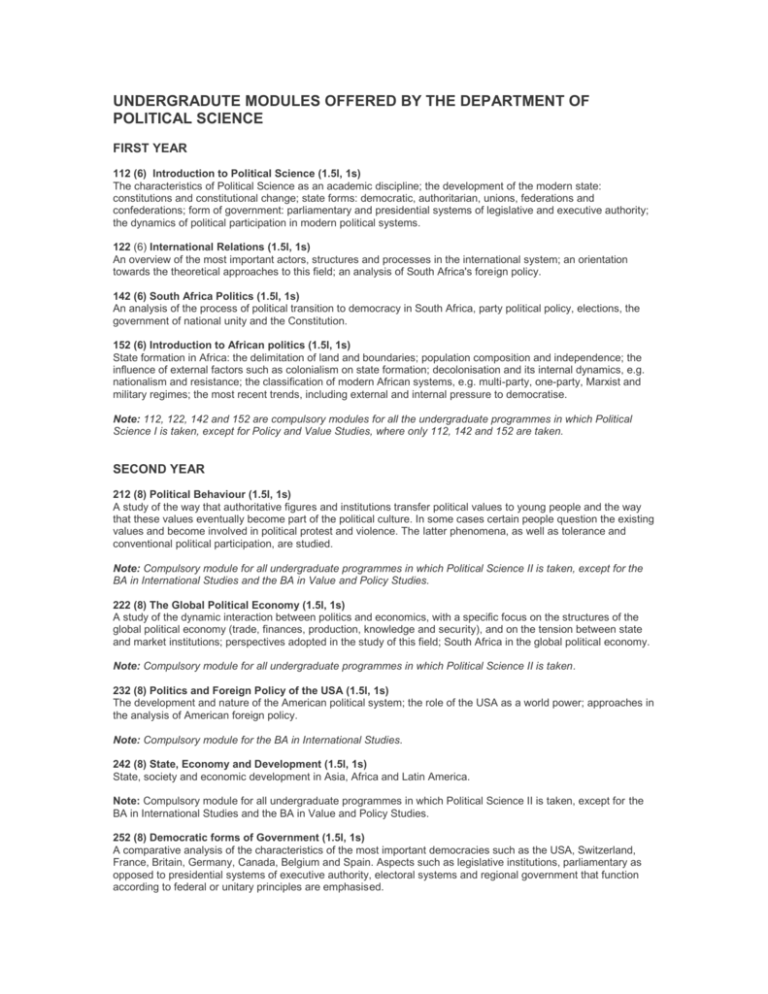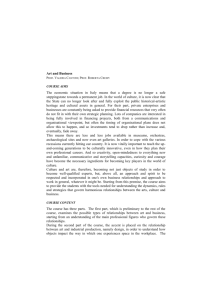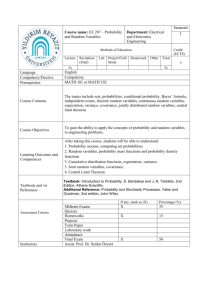Introduction to Political Science
advertisement

UNDERGRADUTE MODULES OFFERED BY THE DEPARTMENT OF POLITICAL SCIENCE FIRST YEAR 112 (6) Introduction to Political Science (1.5l, 1s) The characteristics of Political Science as an academic discipline; the development of the modern state: constitutions and constitutional change; state forms: democratic, authoritarian, unions, federations and confederations; form of government: parliamentary and presidential systems of legislative and executive authority; the dynamics of political participation in modern political systems. 122 (6) International Relations (1.5l, 1s) An overview of the most important actors, structures and processes in the international system; an orientation towards the theoretical approaches to this field; an analysis of South Africa's foreign policy. 142 (6) South Africa Politics (1.5l, 1s) An analysis of the process of political transition to democracy in South Africa, party political policy, elections, the government of national unity and the Constitution. 152 (6) Introduction to African politics (1.5l, 1s) State formation in Africa: the delimitation of land and boundaries; population composition and independence; the influence of external factors such as colonialism on state formation; decolonisation and its internal dynamics, e.g. nationalism and resistance; the classification of modern African systems, e.g. multi-party, one-party, Marxist and military regimes; the most recent trends, including external and internal pressure to democratise. Note: 112, 122, 142 and 152 are compulsory modules for all the undergraduate programmes in which Political Science I is taken, except for Policy and Value Studies, where only 112, 142 and 152 are taken. SECOND YEAR 212 (8) Political Behaviour (1.5l, 1s) A study of the way that authoritative figures and institutions transfer political values to young people and the way that these values eventually become part of the political culture. In some cases certain people question the existing values and become involved in political protest and violence. The latter phenomena, as well as tolerance and conventional political participation, are studied. Note: Compulsory module for all undergraduate programmes in which Political Science II is taken, except for the BA in International Studies and the BA in Value and Policy Studies. 222 (8) The Global Political Economy (1.5l, 1s) A study of the dynamic interaction between politics and economics, with a specific focus on the structures of the global political economy (trade, finances, production, knowledge and security), and on the tension between state and market institutions; perspectives adopted in the study of this field; South Africa in the global political economy. Note: Compulsory module for all undergraduate programmes in which Political Science II is taken. 232 (8) Politics and Foreign Policy of the USA (1.5l, 1s) The development and nature of the American political system; the role of the USA as a world power; approaches in the analysis of American foreign policy. Note: Compulsory module for the BA in International Studies. 242 (8) State, Economy and Development (1.5l, 1s) State, society and economic development in Asia, Africa and Latin America. Note: Compulsory module for all undergraduate programmes in which Political Science II is taken, except for the BA in International Studies and the BA in Value and Policy Studies. 252 (8) Democratic forms of Government (1.5l, 1s) A comparative analysis of the characteristics of the most important democracies such as the USA, Switzerland, France, Britain, Germany, Canada, Belgium and Spain. Aspects such as legislative institutions, parliamentary as opposed to presidential systems of executive authority, electoral systems and regional government that function according to federal or unitary principles are emphasised. Note: Compulsory module for all undergraduate programmes in which Political Science II is taken. 262 (8) International Organisations (1.5l, 1s) Theories of co-operation and normative convergence in the international system; the institutions and political dynamics of state-based international organisations such as the UN; international organisations and International Public Law. THIRD YEAR 314 (12) Political Theory (2l, 1s) Theoretical approaches to the study of the state, capitalism and democracy in South and Southern Africa. Note: Compulsory module for all undergraduate programmes in which Political Science III is taken, except for the BA in International Studies and the BA in Policy and Value Studies. 315 (12) Political Conflict (2l, 1s) Theories of conflict: nature, content and origin; theories of conflict management: negotiation, bargaining and thirdparty intervention. Note: Compulsory module for the BA in Social Dynamics and International Studies. 324 (12) Comparative Southern African Politics (2l, 1s) Contemporary political trends in Africa and Southern Africa (the SADC region and broadly Africa south of the equator including Angola, Zaire, Tanzania, Mauritius and the Seychelles), patterns of democratisation and election issues. South Africa in comparison with the rest of Africa. Note: Compulsory module for the BA in the Humanities, BA in Human Resource Management, BA Law. 334 (12) Political Economy of Asia (2l, 1s) Theoretical and comparative perspectives on the political economy of East and South-East Asia; the contemporary political and economic history of Asia; the relations between South Africa and Asia. Note: This module is compulsory for the BA in International Studies and is an elective module for the BA in Policy and Value Studies. 344 (12) Public Policy (2l, 1s) Comparative study of public policy issues and policy formulation in Southern Africa. Attention is devoted to government systems, political parties and relevant case studies. Note: Compulsory module for all undergraduate programmes in which Political Science III is taken, except for the BA in International Studies and the BA in Policy and Value Studies. 354 (12) (2l, 1s) Researching Politics (2l, 1s) Approaches to political analysis in South and Southern Africa, the methodology of empirical research, and data analysis that is specifically applicable to the socio-political context of South and Southern Africa. Note: Compulsory module for all undergraduate programmes in which Political Science III is taken, except for the BA in Value and Policy Studies. 364 (12) International Relations of Africa (2l, 1s) Africa's international position and role; conflict and co-operation in inter-state relations on the continent; Southern Africa's role in North-South and South-South relations. Note: Compulsory module for the BA in International Studies and an elective module for the BA in Value and Policy Studies.








